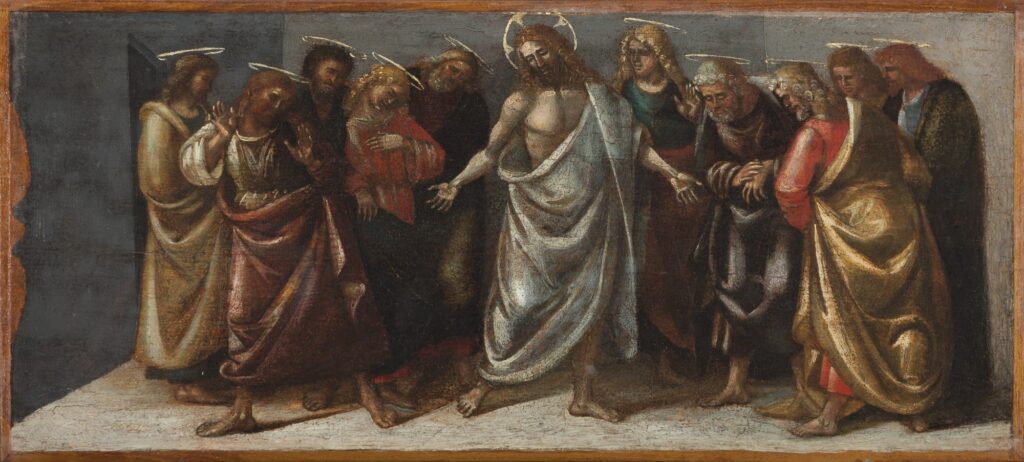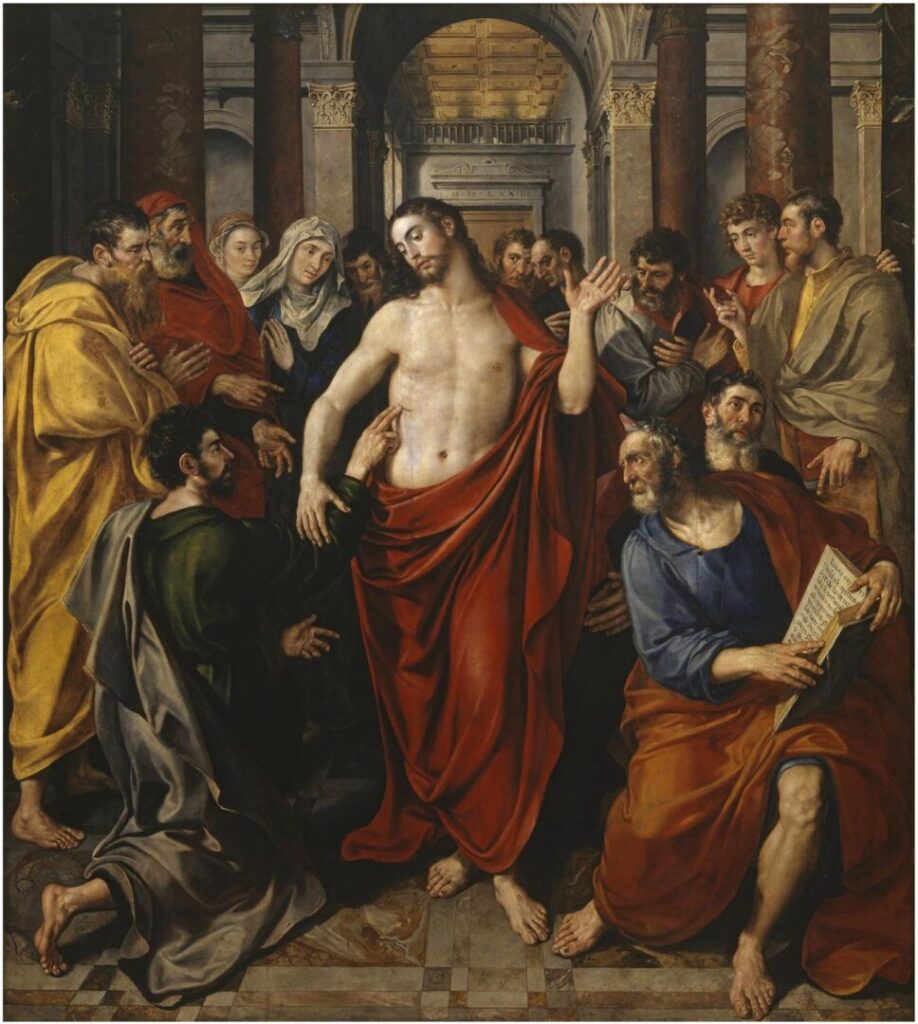Translation of the Gospel According to John (20:19-31)
At that time, when it was late that same day, the first of the week, and the doors were shut, where the disciples were gathered together for fear of the Jews, Jesus came, and stood in the midst and said to them: Peace be to you. And when He had said this, He showed them His hands and His side. The disciples therefore were glad, when they saw the Lord.
He said therefore to them again: Peace be to you: as the Father hath sent Me, I also send you. When He had said this, He breathed on them, and He said to them, Receive ye the Holy Spirit: whose sins you shall forgive, they are forgiven them, and whose sins you shall retain, they are retained.
Now Thomas, one of the twelve, who is called Didymus, was not with them when Jesus came. The other disciples therefore said to him: We have seen the Lord.
But he said to them: “Except I shall see in His hands the print of the nails, and put my finger into the place of the nails, and put my hand into His side, I will not believe.
And after eight days, again His disciples were within, and Thomas with them. Jesus cometh, the doors being shut, and stood in the midst, and said: Peace be to you.
Then He saith to Thomas: Put in thy finger hither, and see My hands, and bring hither thy hand, and put it into My side; and be not faithless, but believing.
Thomas answered, and said to him: My Lord and my God.
Jesus saith to him: Because thou hast seen Me, Thomas, thou hast believed: blessed are they that have not seen and have believed. Many other signs also did Jesus in the sight of His disciples which are not written in this book. But these are written, that you may believe that Jesus is the Christ the Son of God; and that, believing, you may have life in His name.
A Message From Pope Benedict XVI’s Dominus Iesus
The Church’s Magisterium, faithful to divine revelation, reasserts that Jesus Christ is the mediator and the universal redeemer: “The Word of God, through whom all things were made, was made flesh, so that as perfect man he could save all men and sum up all things in himself. The Lord…is he whom the Father raised from the dead, exalted and placed at his right hand, constituting him judge of the living and the dead”.34 This salvific mediation implies also the unicity of the redemptive sacrifice of Christ, eternal high priest (cf. He 6,20 He 9,11 He 10,12-14).
There are also those who propose the hypothesis of an economy of the Holy Spirit with a more universal breadth than that of the Incarnate Word, crucified and risen. This position also is contrary to the Catholic faith, which, on the contrary, considers the salvific incarnation of the Word as a trinitarian event. In the New Testament, the mystery of Jesus, the Incarnate Word, constitutes the place of the Holy Spirit’s presence as well as the principle of the Spirit’s effusion on humanity, not only in messianic times (cf. Ac 2,32-36 Jn 7,39 Jn 20,22 1Co 15,45), but also prior to his coming in history (cf. 1Co 10,4; 1P 1,10-12).
The Second Vatican Council has recalled to the consciousness of the Church’s faith this fundamental truth. In presenting the Father’s salvific plan for all humanity, the Council closely links the mystery of Christ from its very beginnings with that of the Spirit.35 The entire work of building the Church by Jesus Christ the Head, in the course of the centuries, is seen as an action which he does in communion with his Spirit.36
Furthermore, the salvific action of Jesus Christ, with and through his Spirit, extends beyond the visible boundaries of the Church to all humanity. Speaking of the paschal mystery, in which Christ even now associates the believer to himself in a living manner in the Spirit and gives him the hope of resurrection, the Council states: “All this holds true not only for Christians but also for all men of good will in whose hearts grace is active invisibly. For since Christ died for all, and since all men are in fact called to one and the same destiny, which is divine, we must hold that the Holy Spirit offers to all the possibility of being made partners, in a way known to God, in the paschal mystery”.37
Hence, the connection is clear between the salvific mystery of the Incarnate Word and that of the Spirit, who actualizes the salvific efficacy of the Son made man in the lives of all people, called by God to a single goal, both those who historically preceded the Word made man, and those who live after his coming in history: the Spirit of the Father, bestowed abundantly by the Son, is the animator of all (cf. Jn 3,34).
Thus, the recent Magisterium of the Church has firmly and clearly recalled the truth of a single divine economy: “The Spirit’s presence and activity affect not only individuals but also society and history, peoples, cultures and religions… The Risen Christ ‘is now at work in human hearts through the strength of his Spirit’… Again, it is the Spirit who sows the ‘seeds of the word’ present in various customs and cultures, preparing them for full maturity in Christ”.38 While recognizing the historical-salvific function of the Spirit in the whole universe and in the entire history of humanity,39 the Magisterium states: “This is the same Spirit who was at work in the incarnation and in the life, death, and resurrection of Jesus and who is at work in the Church. He is therefore not an alternative to Christ nor does he fill a sort of void which is sometimes suggested as existing between Christ and the Logos. Whatever the Spirit brings about in human hearts and in the history of peoples, in cultures and religions, serves as a preparation for the Gospel and can only be understood in reference to Christ, the Word who took flesh by the power of the Spirit ‘so that as perfectly human he would save all human beings and sum up all things'”.40
In conclusion, the action of the Spirit is not outside or parallel to the action of Christ. There is only one salvific economy of the One and Triune God, realized in the mystery of the incarnation, death, and resurrection of the Son of God, actualized with the cooperation of the Holy Spirit, and extended in its salvific value to all humanity and to the entire universe: «No one, therefore, can enter into communion with God except through Christ, by the working of the Holy Spirit”.41
- Second Vatican Council, Pastoral Constitution GS 45; cf. also Council of Trent, Decretum de peccato originali, 3: DS 1513.
- Cf. Second Vatican Council, Dogmatic Constitution LG 3-4.
- Cf. ibid., LG 7; cf. St. Irenaeus, who wrote that it is in the Church «that communion with Christ has been deposited, that is to say: the Holy Spirit” (Adversus haereses III, 24, 1: SC 211, 472).
- Second Vatican Council, Pastoral Constitution GS 22.
- John Paul II, Encyclical Letter RMi 28. For the «seeds of the Word” cf. also St. Justin Martyr, Second Apology 8, 1-2; 10, 1-3; 13, 3-6: ed. E.J. Goodspeed, 84; 85; 88-89.
- Cf. John Paul II, Encyclical Letter, RMi 28-29.
- Ibid., RMi 29.
- Ibid., RMi 5.


